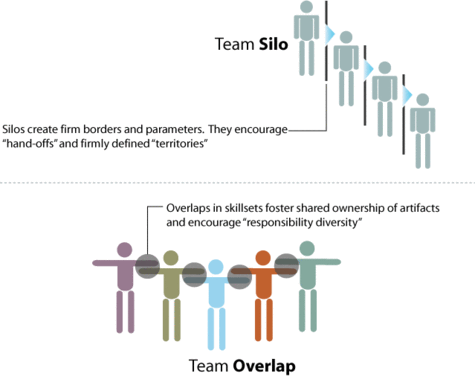Awhile back I read a post about breaking silos of responsibility. These rigid territories of responsibility tend to increase the overhead of communication. In general, I agree with the mentality of fluid responsibility amongst agile self-organizing teams. However, the dangerous side of fluid teams must be explored before allowing a team ‘off the leash’.

Photo provided by Logic + Emotion
Even in the most disciplined teams, tasks belonging to ‘everyone’ actually belong to ‘no one’. In these situations it is commonly heard “I thought you were going to take care of that!” I call this an example of Hippie Socialism.
Hippie Socialism occurs when we sing songs around the campfire, speaking of a society based on even distributions of wealth and trade services. But what happens after the hippie love-fest campfire dies and ways are parted. Damn straight, it becomes a dog-eat-dog world again and the ideals are disregarded for tactics of survival.
Is this any different in a business environment? We have project kick-off meetings where we envision future success as a team. We promise everyone will share responsibilities and be a whistle blower as needed. In the end we tend to silo ourselves so that we may finish the responsibilities we were explicitly tasked. There is little or no time to work on the community tasks, or to help your neighbor. As a result, we are still left with communication overhead and unfinished tasks.
Perhaps I am taking the concept to a negative extreme, but exploring this allows a possible conclusion that some (even if thin) lines of authority must be drawn for progress to be made. As an example, I found a post scrutinizing a common management mantra, “Hire the best people, then get out of the way“. Paraphrasing his modified mantra:
Hire the best people, give them clear goals, give them the authority to achieve those goals, and then you get out of the way… – Stephen A. Bohlen
Managers with strong leadership skills but no domain knowledge tend to run responsibility silos so they may ‘black box’ or cover their weaknesses. Managers with strong knowledge but are weak leaders tend to run hippie communes. Without strong leaders to help find the sweet spot on agile teams just beware that agile self-organizing teams can be equally as dangerous as silo teams.


